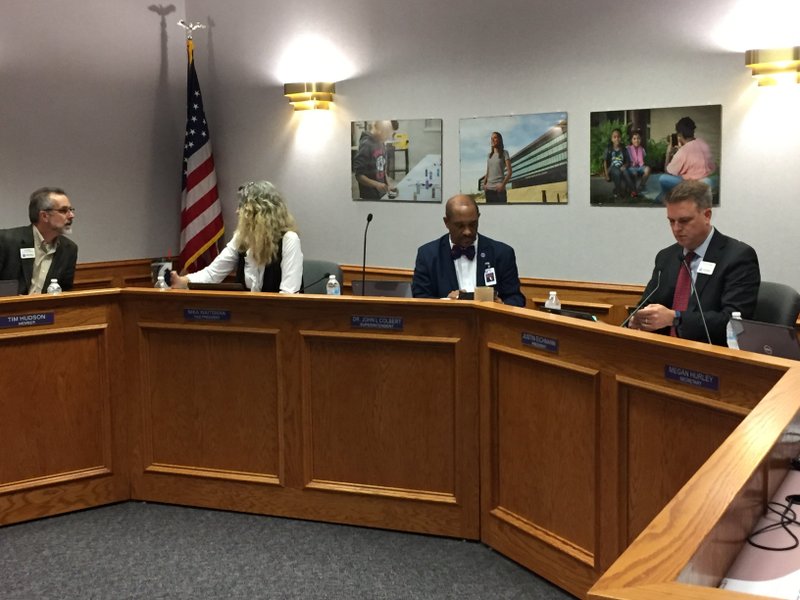FAYETTEVILLE -- The School District would have $111 million to build more facilities and maintain and upgrade the ones it has if voters approve restructuring some existing bond issues in February.
The School Board agreed by a 5-0 vote Thursday to hold an election on the matter Feb. 11. District officials stressed there would be no tax increase if voters approve the measure.
Breakdown
Here’s an approximate breakdown, by percentage, of how the Fayetteville School District would spend $111 million if voters approve a bond restructuring in February.
• New school facility and/or school expansion: 32%
• Addressing needs identified through facility condition assessment: 20%
• Student Wellness Academic Complex at Fayetteville High: 15%
• Contingency funds: 8%
• Land acquisition: 7%
• Students Teams Activities Complex at Fayetteville High: 7%
• Retain architect, construction manager and engineer: 3%
• Ramay Junior High accessibility, safety and security improvements: 2%
• LED lighting project: 2%
• Site drainage: 2%
• Junior high school track projects: 1%
Source: Fayetteville School District
About 40% of the money generated from the bond restructuring would go to purchasing land and building a school on the district's west side. The fifth and sixth grades at Owl Creek School, which houses prekindergarten through sixth grade, would shift to the new building, said Superintendent John L Colbert.
The district also plans to build both a Student Wellness Academic Complex and a Student Teams Activities Complex at Fayetteville High School, adjacent to the athletic fields. Those buildings would replace crowded, inadequate facilities used primarily by student athletes, but would be used for academic purposes as well, district officials said.
Another large chunk of the money generated -- roughly 20% -- will go to facility needs districtwide identified through a facility assessment done earlier this year.
There's also money earmarked for a track at Woodland Junior High School, resurfacing of the track at Ramay Junior High, and installing LED lighting, which will save the district nearly $250,000 annually in energy costs, according to Megan Slocum, associate superintendent for support services.
"To me this is a very diverse and balanced approach," said board President Justin Eichmann. "It touches every building across the district and raises the overall level of our facilities districtwide."
Colbert said the district has done its homework to determine all of its most pressing facility needs. The bond restructuring is "badly needed," he said.
The district identified eight of its current bond issues to be restructured, or refinanced, to raise the $111 million. The district's annual maximum debt service payment of $15.6 million will remain about the same, but payments will be extended for a number of years.
Whereas the debt payment currently is expected to dwindle to $2.1 million by 2035, the bond restructuring would have the district paying $11 million that year through 2050, according to figures provided by the district.
"By doing it this way, the district can take it to the public without doing a millage increase," said Kevin Faught, senior vice president for Stephens, a financial services firm assisting the district.
Fayetteville's millage rate is 45.65, which is fourth highest among the 15 school districts in Northwest Arkansas. Pea Ridge has the highest at 48.7.
The election is being held Feb. 11 despite the fact the primary election will be held only three weeks later. District officials have said that's because a February election will allow the district to take advantage of favorable interest rates and address key funding requests. Glenda Sullins, director of finance, said they anticipate the special election will cost about $5,000.
Also Thursday, board members unanimously agreed to appoint former member Chris Bell to the board's Zone 4 seat on an interim basis.
Garrett Richardson, who was appointed to the seat in July, resigned last week because he moved to a new home less than 100 feet outside the zone, according to Eichmann.
Board member Tim Hudson said he'd talked to Bell, who expressed a willingness to serve until School Board elections in March. Justin Jones and Katrina Osborne are running for the seat. The winner will get a five-year term starting in March.
Bell, a retired banker, served on the board from 2001 to 2007. Her financial background will be helpful to the board, Hudson said.
NW News on 11/22/2019

